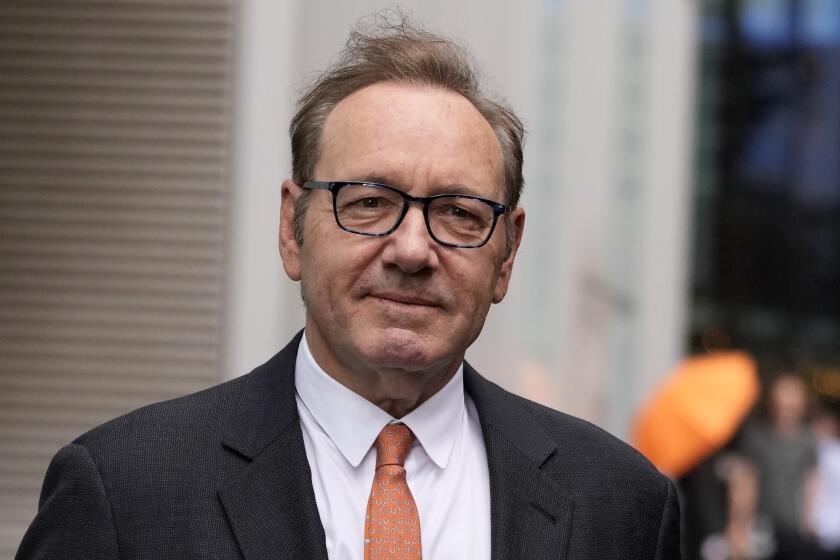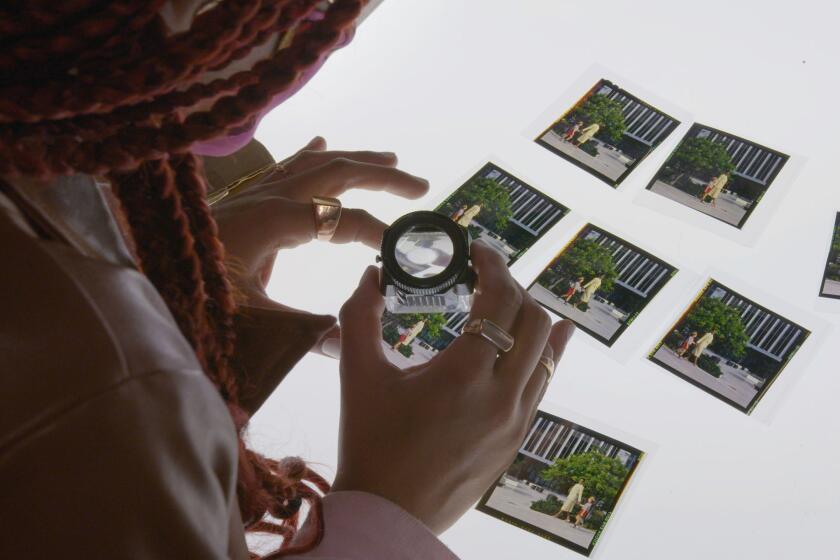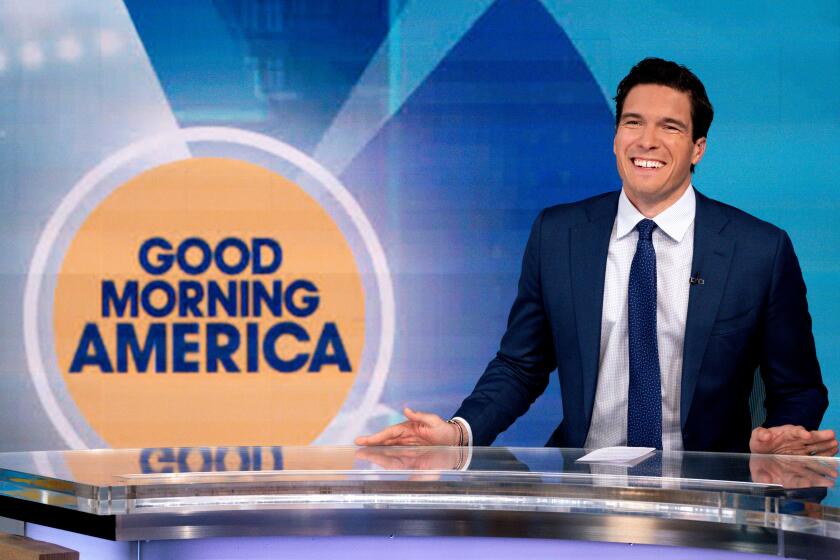Toronto scene: Stars and substance
TAKING my first elevator ride this weekend after coming home from the Toronto International Film Festival, my palms began to sweat, my face felt clammy and suddenly I realized I was going through celebrity withdrawal. I know it sounds crazy, since L.A. is supposed to be the nexus of the showbiz universe, but at the festival, which ended Saturday, you get so used to seeing stars everywhere you turn that you begin to feel like the two paparazzi I saw the other day, staked outside the Park Hyatt Hotel. One guy, gesturing toward the revolving-door entrance, asked casually, “Who’s here?” The other replied, “Oh, nobody. Just Elvis Costello.”
It was hard to get into an elevator without bumping into an actor. One day, riding down to the lobby, I was so intent on trying to figure out who the funny Brit in bare feet was -- I knew his voice but couldn’t place the face -- that it only hit me after I got out that his companion was Laura Linney. One day, having grabbed a steaming hot dog from a street vendor to tide me over till dinner, I got into an elevator, hoping to slip upstairs unnoticed, when suddenly a swarm of festival-goers crowded into the elevator, led by Parker Posey, who mercilessly mocked my choice of condiment, wondering why I had picked ketchup when there were now so many other tantalizing alternatives available.
Apparently you couldn’t even get married in Toronto without having to fend off a movie star. One day I shared an elevator with a florist who’d just finished handling a wedding in a penthouse suite at the Four Seasons. During a key juncture of the ceremony, Kevin Costner, apparently also staying in a penthouse suite, took a wrong turn and walked into the wedding by mistake.
One afternoon I was walking past the Four Seasons when a chorus of squeals erupted from the crowd gathered there, waiting for their celebrity fix. A procession of black SUVs made its way out of the hotel garage when suddenly someone’s head popped out from a sunroof and -- voila -- there was Emma Thompson, waving at the crowd. When I interviewed her the next day, I teased her about such exhibitionism, saying I never imagined someone who read English at Cambridge would be caught hamming it up for the paparazzi.
“But it was fun!” she laughingly replied. “After all, that’s what we’re here for -- to tout our wares and beat the drums. It takes the curse off it, doesn’t it?”
She studied my face to see if I was buying her explanation. Then, offering a sly grin, she added, “So, what did you really think? Tart?”
Not all the star turns were for laughs. The festival is, after all, a serious marketplace where Oscar hopes begin, much-hyped films take a critical beating and big movie buying decisions are made. One of the smaller films that did especially well here this year was “Away From Her,” a film directed by Sarah Polley, which features a terrific performance from Julie Christie. The movie sold to Lionsgate, but only after a fierce round of bidding between that company and Sony Pictures Classics.
The morning after the sale I was talking with Sony Classics co-chief Michael Barker in the lobby of the Sutton Place when the diminutive Polley spotted him, sprinted over, threw out her arms and enveloped him in a hug that seemed to last longer than the running of the Kentucky Derby. No words were exchanged, nor were they needed. Everyone’s eyes were glistening by the time she departed. Polley may be an actress, but this was no actressy gesture. It was her way of saying, “I’m sorry this call didn’t go your way, but I love how much you guys care about movies.”
As is often the case, the festival gave far more blessings to smaller films than large ones. Favorites included “Venus” (with a potential Oscar turn by Peter O’Toole), “The Lives of Others” (the German drama was a critic’s fave), “Catch a Fire,” “Borat,” “The Namesake,” “Volver” and “The Last King of Scotland” (largely thanks to a showy performance by Forest Whitaker). The stinkers were the studio entries, notably “The Fountain,” a much-derided, largely indecipherable Darren Aronofsky film from Warners that prompted one critic, upon seeing the dreaded anti-piracy scanners at his screening, to snort, “Who on Earth would want to pirate that film?”
My favorite interview -- well, more like an audience -- was with Yoko Ono, who was on hand promoting “The U.S. vs. John Lennon,” a documentary now in release that chronicles how Lennon’s antiwar activism prompted covert FBI surveillance and a government attempt to deport him. In the movie, she’s the iconic Yoko of pop lore, chubby and cherubic.
Today, at 73, she’s sleek and fashionably slender, looking more like a society lady than the avant-garde artist of her youth. Wearing tinted aviator glasses and elegant black slacks, she arrived accompanied by long-time handler Elliot Mintz (best known these days as Paris Hilton’s publicist). No handling was needed. Ono stayed imperturbably on message, no matter what question she was asked.
According to Ono, Lennon never cared about having hit records. “He wanted to create a social revolution,” she told me. “He was a very political person. For him, being from Liverpool made him a real outsider, and he always had a strong feeling about changing the world.”
You could say the same thing about half the films that were at the festival this year. Toronto is always full of combative, outrageous fare, but it was striking to see how many films seemed to come armed with a detonator. If artists are the antennae of the race, as Ezra Pound once said, you’d have to say that people everywhere are being roused to activism by the woeful state of world affairs.
The political film that got the most hype was “Death of a President,” but once you got past its incendiary title (which few of its detractors did) it was a film that didn’t have anything especially original to say -- its view of American politics could be found any Sunday in Frank Rich’s column. For me, the movie that had the most indelible connection to current events was “Catch a Fire,” the much-praised Phillip Noyce drama set in 1980s-era South Africa. When a friend asked what it was about, I told him it was the story of a country so traumatized by its fight against terrorism that it arrests and tortures an innocent, peace-loving man, doing such a good job of infuriating him that when he’s released from prison he becomes the most ardent terrorist of all.
My pal joked: “So, it’s really about today.” And so it is. The parallels are striking, whether your point of view takes you to the horrors of Abu Ghraib, Israel’s war with Hezbollah or the repressive regimes of Egypt and Iran. As Noyce acknowledges, “This is a story that’s set in 1980, but it’s also set in 2006.”
That tragic conundrum -- that when violence erupts, every ugly action leads to an even more appalling overreaction -- was present in myriad films here. “Gunner Palace’s” Michael Tucker arrived as co-director of “The Prisoner or: How I Planned to Kill Tony Blair,” a startling film about Iraqi journalist Yunis Abbas, another victimized innocent man. Having been jailed and beaten bloody under Saddam Hussein, he rejoices when the Americans liberate Iraq, only to end up being accused of being a bomb maker and imprisoned for eight months, some of it spent in Abu Ghraib, before his American captors acknowledge their mistake and let him go free.
Another popular film, “Black Book,” a World War II drama about the Dutch underground from director Paul Verhoeven, had its own eerie resonance with today, especially in its portrayal of the brutal treatment of collaborators by the Dutch at war’s end. “It really is disgusting how animalistic people can be,” Verhoeven told me. “This movie was written before we knew about Abu Ghraib, but when I saw the photographs from that prison, I thought, ‘Nothing ever changes.’ Awful behavior is everywhere, whether it’s the Dutch or Iraqis or Israelis or Al Qaeda. It’s as if we get some diabolical pleasure from humiliating each other.”
For a quiet moment at the festival, I often duck into the quaint old Church of the Redeemer that sits between the giant hotels and office buildings in the heart of the festival neighborhood. This year the church felt as engaged as the films around it. Its message board read: “Remember New York City, Madrid, Mumbai, London, Washington, Bali.... Peace.” At this film fest, everyone has their say, so it was hardly a surprise that someone had scrawled alongside the other cities: “Israel ... Israel.”
Sitting in the cool quiet of the chapel, my weary, information-overloaded soul found solace. Even if the world is plunging into the abyss, no one can accuse today’s filmmakers of not shining a light against the darkness.
“The Big Picture” runs Tuesdays in Calendar. Questions or criticism can be e-mailed to patrick.goldstein@latimes.com.
More to Read
Only good movies
Get the Indie Focus newsletter, Mark Olsen's weekly guide to the world of cinema.
You may occasionally receive promotional content from the Los Angeles Times.










